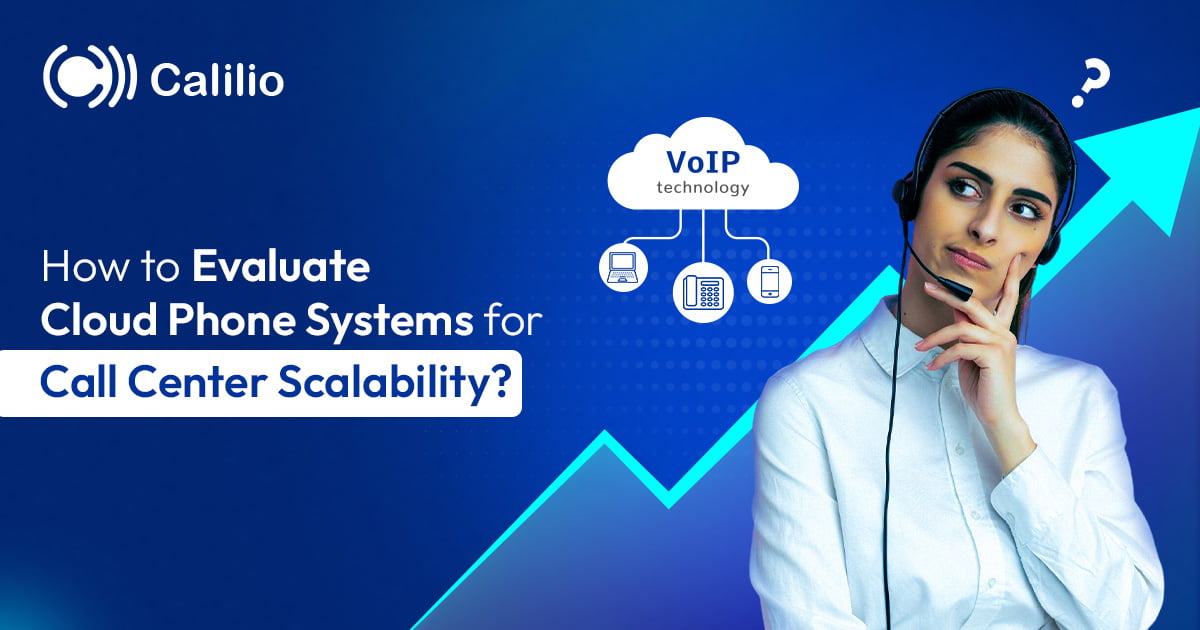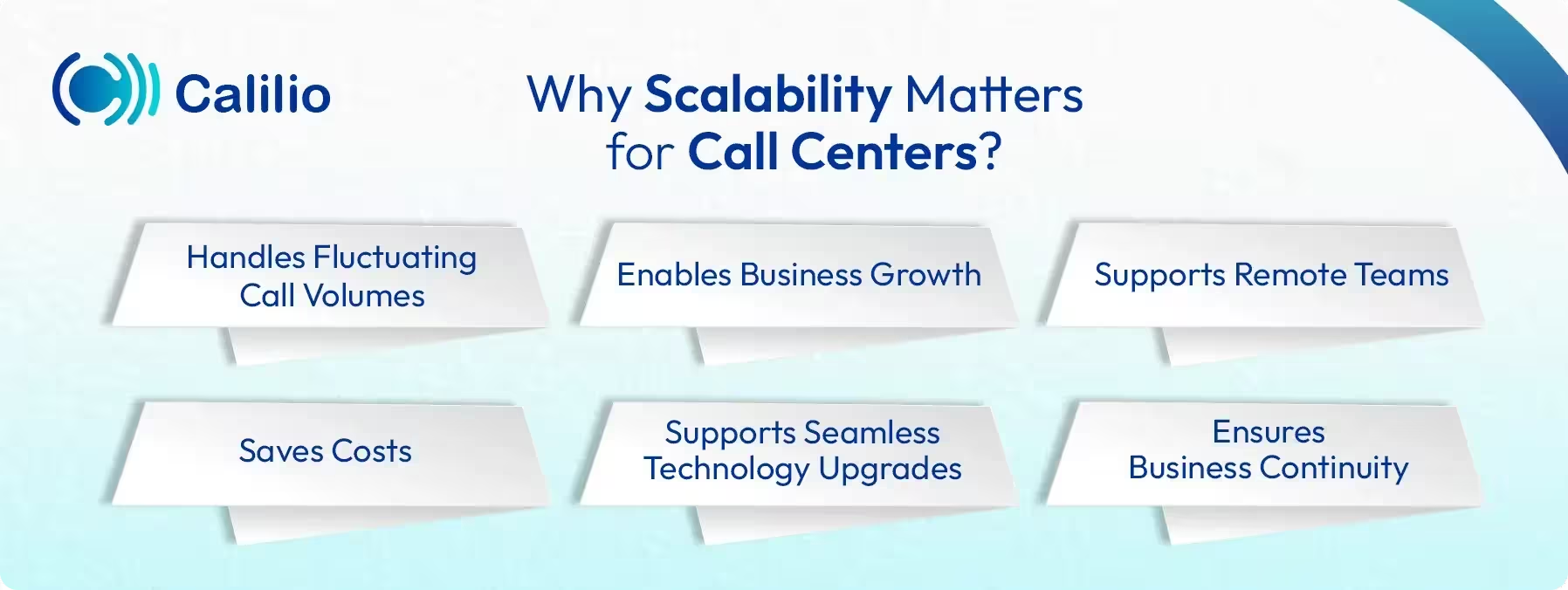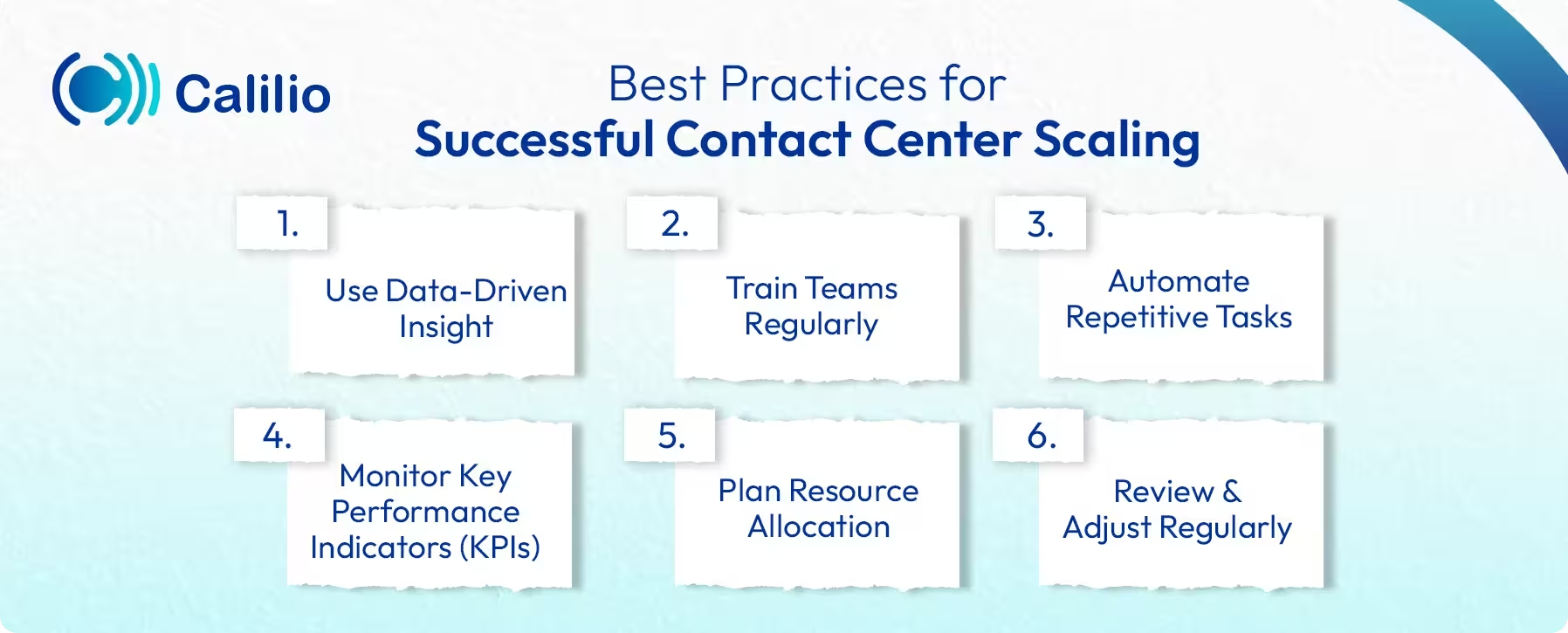How to Evaluate Cloud Phone Systems for Call Center Scalability?

Traditional phone systems often struggle to keep up with higher call volumes, remote teams, and rising client expectations as a call center grows. The result? Dropped calls and long wait times that frustrate customers.
That’s where cloud phone systems come in. They allow call centers to scale operations easily, adding new agents, locations, or features without extra hardware or setup delays. However, not every cloud solution can handle rapid business growth. That’s why it's important to know how to evaluate cloud phone systems for call center scalability.
In this blog, we’ll explain what scalability means in cloud phone systems, why it’s important, and the criteria to evaluate cloud phone systems to help you choose a platform that truly supports your growth.
Key Highlights:
Call center scaling means adjusting your system to handle more (or fewer) calls without affecting service quality.
Scalability supports business growth, improves customer experience, reduces costs, and ensures long-term flexibility.
When choosing a cloud phone system for scalability, consider the key evaluation criteria such as system performance, AI capabilities, CRM integrations, uptime reliability, security measures, and flexible pricing options.
To scale your contact center effectively, focus on data-driven insights, automation, omnichannel support, agent training, and strategic resource planning.
What is Call Center Scaling?
Call center scaling means expanding or adjusting a call center’s operations, technology, or staffing to handle changing communication demands while maintaining service quality and efficiency.
Effective scaling helps avoid common call center challenges and maintain the performance, whether you’re adding new departments, hiring remote agents, handling more calls or entering new markets. Overall, it keeps your operations flexible, cost-efficient, and ready for any workload, without complicated setups.
There are two types of scaling:
- Scaling Up (Vertical Scaling): Adding more agents, features, or resources to manage higher demand.
- Scaling Down (Horizontal Scaling): Reducing resources or reallocating agents when demand decreases.
Why Scalability Matters for Call Centers?
A scalable call center adapts to changing demands, handles fluctuating call volumes, supports remote teams, enables business growth, reduces costs, integrates new technology smoothly, and ensures continuity during maintenance or outages.

- Handles Fluctuating Call Volumes: A scalable system adjusts easily during busy or slow periods without affecting performance or customer experience.
- Enables Business Growth: As the company expands, scalability allows adding new staff, features, or departments without major technical changes.
- Supports Remote Teams: Scalable call center solutions make it easy to add new agents from anywhere with minimal setup.
- Saves Costs: Scalable call centers let you scale up during peak periods and scale down when demand drops, helping you avoid overpaying for unused capacity.
- Supports Seamless Technology Upgrades: Scalable systems can smoothly add new tools or communication channels without disrupting service.
- Ensures Business Continuity: Scalable systems are easier to update and recover. So, there is less downtime during maintenance or unexpected outages.
Steps to Evaluate Cloud Phone Systems for Call Center Scalability
When evaluating cloud phone systems for call center scalability, focus on platform performance, reliability, integrations, pricing flexibility, and security. Ensure the platform offers advanced AI features, 99.99% uptime, and pay-as-you-grow pricing for seamless expansion and long-term efficiency.
1. Assess Current and Future Needs
Identify your current call volume, number of agents, and expected growth rate. This helps you understand how much capacity you’ll need in the coming months or years. Choose a system that can easily scale up or down without major technical changes.
2. Test System Performance
Request a demo or trial from the provider to test call quality and response time. Check how the system performs during high call loads or peak hours. A reliable platform should maintain consistent performance without lag or dropped calls.
3. Check Integration Support
Ensure the system connects seamlessly with CRMs, helpdesk software, and collaboration tools your team already uses. This reduces manual data entry and keeps workflows unified across departments.
4. Review AI and Automation Features
Modern call centers depend on AI to handle repetitive tasks and deliver insights. Look for features like AI call summaries, transcriptions, and sentiment analysis that help agents save time. These tools improve performance and make scaling easier as call volumes grow.
5. Evaluate Reliability and Uptime
A scalable cloud phone system must offer consistent uptime and stable performance. Look for providers that guarantee at least 99.99% uptime and have multiple data centers. This ensures your team stays connected even during high-demand periods.
6. Compare Pricing Models
Check whether the provider offers flexible or pay-as-you-go pricing plans. A scalable pricing model ensures you pay only for what you use, keeping costs predictable as your team expands. Moreover, look for a platform with transparent pricing to avoid any hidden fees and ensure long-term affordability.
7. Analyze Security Standards
Security isn’t just about encryption; it’s about meeting call center compliance standards as your business scales. Make sure your cloud phone provider complies with call center regulations like GDPR, SOC 2, or similar regulations.
8. Read Customer Feedback and Reviews
Before finalizing a provider, read customer reviews and testimonials. Learn about the experiences of other call centers using the system during scaling or rapid growth. Real-world feedback helps you understand reliability, support quality, and overall satisfaction.
Best Practices for Successful Contact Center Scaling
>Successful contact center scaling requires analyzing performance data, automating workflows, and tracking key metrics. Businesses should also train agents regularly and scale resources based on forecasted demand.

- Use Data-Driven Insights: Analyze call volumes, wait times, and agent performance to predict demand and make informed scaling decisions.
- Train Teams Regularly: As you expand, provide consistent training to keep agents aligned with system updates and customer service standards.
- Automate Repetitive Tasks: Implement IVR, call routing, and AI call summaries to reduce manual work and free agents for complex issues.
- Monitor Key Performance Indicators (KPIs): Keep an eye on service level, first-call resolution rate, and customer satisfaction to measure scalability success.
- Plan Resource Allocation: Assign staff, technology, and budget according to demand forecasts to avoid overload or waste.
- Review and Adjust Regularly: Revisit your scaling strategy often to refine processes, technology, and staffing as your center evolves.
Common Mistakes to Avoid When Evaluating Cloud Phone Systems
When evaluating cloud phone systems for call center scalability, avoid mistakes like choosing the cheapest option, neglecting integrations, or overlooking uptime and security. Test the solution thoroughly to ensure long-term reliability and performance.
- Focusing Only on Price: Choosing the cheapest option may lead to poor performance, limited scalability, and missing features.
- Ignoring Integration Capabilities: A system that doesn’t integrate with CRMs or support tools slows down workflows and reduces efficiency.
- Overlooking Uptime and Reliability: Low uptime or poor redundancy can cause frequent service interruptions during peak hours.
- Underestimating AI and Automation: Not considering AI tools for your phone system means missing opportunities for faster workflows and smarter call handling.
- Neglecting Security and Compliance: Weak data protection or non-compliance can result in legal issues and loss of customer trust.
- Not Testing Before Purchase: Skipping demos or free trials means you miss the chance to see how the system actually works and whether it’s easy for your team to use.
Conclusion
Scalability is no longer optional; it’s a must for any modern call center aiming to grow, adapt, and deliver consistent service in a fast-changing environment. A well-chosen cloud phone system makes it easier to manage increasing call volumes, remote teams, and customer expectations without adding complexity or cost.
Calilio’s call center software is built specifically for this kind of growth. It gives you cloud-based flexibility to easily add or remove agents, phone numbers, or lines, without requiring hardware changes. Plus, its softphone access provides remote work support, making it ideal for managing large or distributed teams.
Summarize this blog with:
Frequently Asked Questions
How can I identify when it’s time to scale my call center?
You should consider scaling your call center when call volumes consistently exceed your team’s capacity, leading to long wait times or missed calls. Other signs include rising customer complaints, overworked agents, or a need to expand into new markets or channels.
Can remote or hybrid agents be supported effectively when scaling a call center?
Are there limits to how many channels (voice, SMS, chat) a system can support as I scale?
How do I measure the success of scaling initiatives in a call center?

Still have questions?
Can’t find the answer you’re looking for? Please chat with our friendly team.
Stay in the loop
Get the latest call insights, trends, and updates delivered straight to your inbox.
By subscribing, you agree to receive updates from Calilio.
You can unsubscribe anytime.
